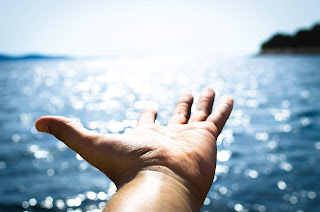My year of less is more: decluttering toys
When our eldest child was two we had one small plastic box of toys. By the time he was three years old and we had our second child we had a small shelf of books and toys. By the time we had three kids we had a cupboard of toys. By the time we had four we had a family room full of toys and by the time we had five we had toys in the playroom, the hallway cupboard and in their bedrooms.
For years I have had to work hard to not end up with literally mountains of toys through our house. Every Christmas we'd kind of stumble home with a boot load of gifts. And we have an extended family that is on the extremely conservative end of the spectrum. I can't even conceive what we would have ended up with if we had family that over-gave.
And that's sometimes what is tricky about decluttering toys. A large percentage of them are probably gifts. Or they're presents that you carefully chose for your kids. Or it's a set of trains that you spend years gradually collecting. Or they are toys you didn't have as a child. Some of the toys may have given our children hours of joy when they were cute, chubby toddlers and now they're a great lanky 15 year old and hey, where did the time go? (*little sob*).
How do you declutter your toys especially if you feel quite emotionally connected to them? And what about your kids? Will they cope if you take their toys away? (my kids react in two ways - 'Sure, chuck it' or 'Noooo, that precious stick is mine that I found walking home from school that day').
My primary goal in decluttering toys is that they need space to play. This is when the less is more principle kicks in. Less toys, more deep, creative play. Less clutter, more room to move, to dance, to pretend. If their room is literally a mountain of toys and there's no floor space, they can't set up their imaginary school or create an underwater world out of Lego. I think that having less toys (but carefully selected toys) results in better playing, more creative playing, more resourceful playing. They might even get a bit bored and go outside …
I grew up in India where a common sight throughout the country are groups of small boys playing cricket on any spare patch of dirt they can find. Regularly they would only have a ball made out of scraps of string and rope. And the bat would often be a plank of wood. I remember one afternoon just sitting and watching a group of them playing. They'd imitate everything. Yelling 'HOWZAT'. The bowling styles of various players. Arguing with the umpire. They were poor kids, with probably almost no toys. While they would have been thrilled with the toys my kids have (there is nothing romantic about poverty), they were playing a game that my kids would envy for the amount of fun and joy it brought.
Why? Because it involved other people. They weren't sitting in a room on their own with a pile of plastic toys. It involved being outside. It involved imitating adults (a big part of the purpose of play). It involved being deeply creative with a small amount of resources.
This story reminded me that having a lot of toys doesn't always equal happy kids. Often it can cause a lot of stress as we yell at our kids for the amount of 'mess' they've made, when in fact it's the adults that have allowed all the toys to remain. If we had less of them, there would be less cleaning up, less stuff to argue about. And maybe better, more thoughtful and creative playing would result.
What have been my favourite long lasting toys? Toys that are flexible. Something like our doll house where the rooms can be rearranged. Or our little kitchen that has been used to play mums and dads or becomes a cafe that takes orders. The duplo that can be built into massive cities.
And what do I do with the toys we don't want? I have given lots away (look out for a family with kids five years younger than yours). I have thrown out the Polly Pockets, where there were so many bits missing and someone had decided to run a hairdressing service with them so they all had short hair (I give them points for creative play). You could sell them on ebay if you have a good collection of something. Find a playgroup/preschool that takes toys (but be prepared, they might say no because they get a lot of offers). If you don't want to get rid of toys completely, put half away and rotate the toys.
Try and speak positively about the richer, less 'stuff'-orientated life you'll have if you declutter your kid's toys. Ask them about giving their toys away, and be positive about it. 'Think about the joy you'll give someone else'. 'Think about all the other great toys you DO have to play with'. If it's hard, take photos of toys they've really enjoyed but don't play with anymore. Don't keep bucketloads of toys for your imaginary grandkids. Your grandkids will get lots of their own, new toys.
And try and be brave yourself (eeek!).




Comments
I began a discussion today with my husband about the need for some more serious toy and bedroom decluttering to fit in some room for study space. So it was timely to read your post today.
Looking forward to reading more of your thoughts on decluttering! :)
I've read your blog for a while but have never commented! Just want to say I love this series of decluttering posts. A topic close to my heart!
I especially liked this line: "My primary goal in decluttering toys is that they need space to play. This is when the less is more principle kicks in. Less toys, more deep, creative play. Less clutter, more room to move, to dance, to pretend."
My kids are only 1 and 3 (so never really had to do any negotiating when decluttering toys!) but I've noticed since whittling away at their toy collection that they are much more creative with the toys that they do have, and they are more focused when they do play because there isn't a mountain of other toys surrounding them.